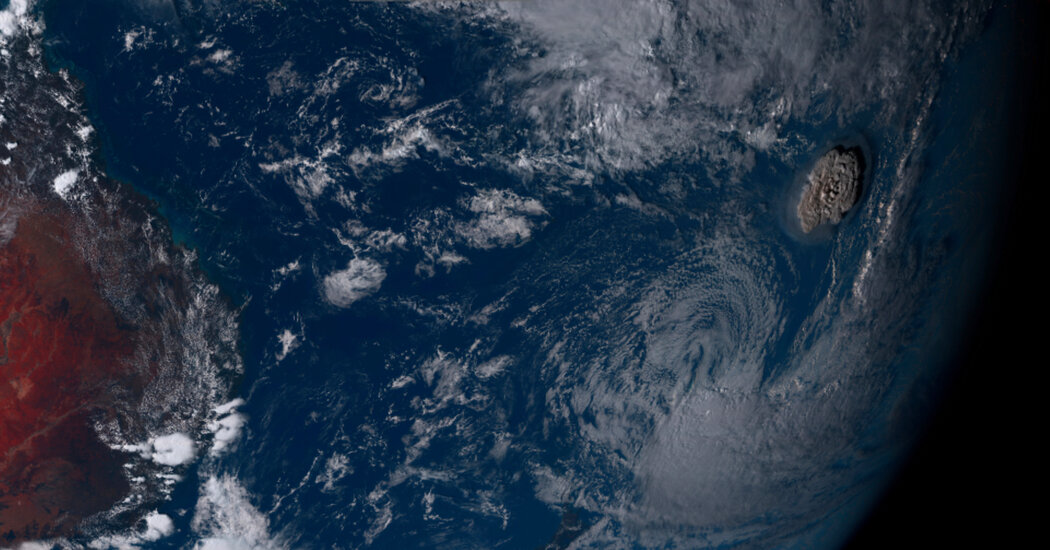So far, the only deaths reported occurred 6,000 miles away, in Peru. But outside emergency workers have yet to make their way to the Pacific island nation.
Boats bashed into a quiet harbor in Southern California, a remote island was battered in Japan by four-foot waves and two women were swept to their deaths on a beach in Peru — some 6,000 miles from an undersea volcanic eruption so powerful that the tsunami it set off churned ocean waters halfway across the globe.
But on Sunday, as reports of the volcano’s impact trickled in from far-flung countries, there was little word from Tonga, the island nation just 40 miles from the site of the extraordinary explosion. As concerns grew, the nation of about 100,000 remained largely cut off from the rest of world, its undersea internet cables knocked out of commission by the volcano.
Early videos captured islanders rushing to higher ground as the first powerful waves crashed ashore. And reports that emerged Sunday described a land rendered ghastly gray by volcanic debris, its waters poisoned by the ash sent tens of thousands of feet skyward when the Hunga-Tonga-Hunga-Ha’apai volcano erupted Saturday evening.
“Shops along the coast have been damaged and a significant cleanup will be needed,” Jacinda Ardern, the prime minister of New Zealand, which has close ties with Tonga, said Sunday at a news conference.
The tsunami, she said, dealt a powerful blow to the capital of the archipelago, “with boats and large boulders washed ashore.”
But there remained no word of any casualties, unlike an ocean away in northern Peru. There, on a beach known as Naylamp in the province of Chiclayo, two women were overcome by “unusually large” waves on Saturday and drowned, the police said.
The police described the beach as unsuitable for swimming, but it was not clear that the women, who were with family members, were in the water when the waves hit. The husband of one victim, who survived, said they had been about 600 feet from the shore, the police reported.
Peru, unlike neighboring Chile and Ecuador, declined to close beaches or issue tsunami warnings after the eruption, apparently believing it was in no danger. But seawater flooded several coastal areas of Peru on Saturday, surprising tourists and beachgoers, images on TV and social media showed.
The authorities closed several beaches in Peru on Sunday and warned about abnormal wave activity.
The deaths in Peru were reminiscent of the aftermath of the powerful tsunami set off by an undersea earthquake off Indonesia in December 2004 which killed more than 250,000 people. A dozen of the dead then were hit by waves on the eastern coast of Africa, in Kenya and Tanzania.
In Tonga on Sunday, many residents lost not only communication ties but power. Up to 80,000 people there could be affected, the International Federation of Red Cross and Red Crescent Societies told the BBC.
One immediate need was clear: potable water.
“The ash cloud has, as you can imagine, caused contamination,” said Ms. Ardern, the New Zealand prime minister. “That’s on top of already a challenging environment, in terms of water supply.”
New Zealand and other nations in the region pledged to give Tonga aid to recover. So did the United States. But with heavy concentrations of airborne ash making flights impossible, it was difficult even to know what was needed.
Ms. Ardern said flights over Tonga were planned for Monday or Tuesday, depending on ash conditions. New Zealand’s navy was also preparing a backup plan, should the ash remain heavy, she said.
In a post on Twitter, Antony J. Blinken, the American secretary of state, offered his condolences: “Deeply concerned for the people of Tonga as they recover from the aftermath of a volcanic eruption and tsunami. The United States stands prepared to provide support to our Pacific neighbors.”
Tonga has experienced a succession of natural disasters in recent years. In 2018, more than 170 homes were destroyed and two people killed by Cyclone Gita, a Category 5 tropical storm. In 2020, Cyclone Harold caused about $111 million in damage, including extensive flooding.
The country has reported just one case of the coronavirus, but it has struggled economically during the pandemic. It closed its borders in March 2020, effectively cutting off tourism, which had previously made up about 12 percent of the country’s GDP.
And it may not be done with Hunga-Tonga-Hunga-Ha’apai.
“We stand ready to support the government and the people of Tonga,” a spokesperson for the United Nations in the Pacific said in a post on Twitter. “Unfortunately this is not over, and more eruptions and consequent tsunamis may follow.”





























